Related Research Articles
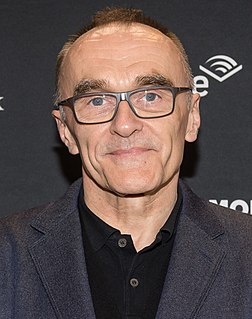
Daniel Francis Boyle is an English director and producer. He is known for his work on films including Shallow Grave, Trainspotting and its sequel T2 Trainspotting, The Beach, 28 Days Later, Sunshine, Slumdog Millionaire, 127 Hours, Steve Jobs and Yesterday.
Big Flame were a post-punk/indie rock three piece band, based in Manchester, England and active from 1983 to 1986. The members were Alan Brown, Greg Keeffe (guitar) and Dil Green (drums). After a debut EP ("Sink") on their own Laughing Gun label, they joined the Ron Johnson roster for a series of mid-1980s singles as well as an appearance on the NME's C86 compilation.
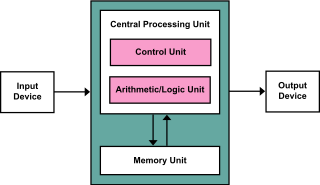
The von Neumann architecture — also known as the von Neumann model or Princeton architecture — is a computer architecture based on a 1945 description by John von Neumann, and by others, in the First Draft of a Report on the EDVAC. The document describes a design architecture for an electronic digital computer with these components:

Stephen Byram Furber is a British computer scientist, mathematician and hardware engineer, currently the ICL Professor of Computer Engineering in the Department of Computer Science at the University of Manchester, UK. After completing his education at the University of Cambridge, he spent the 1980s at Acorn Computers, where he was a principal designer of the BBC Micro and the ARM 32-bit RISC microprocessor. As of 2018, over 100 billion copies of the ARM processor have been manufactured, powering much of the world's mobile computing and embedded systems.

The Department of Computer Science at the University of Manchester is the longest established department of Computer Science in the United Kingdom and one of the largest. It is located in the Kilburn building on the Oxford Road and currently has over 800 students taking a wide range of undergraduate and postgraduate courses and 60 full-time academic staff.

Jack Joseph Dongarra is an American computer scientist. He is the American University Distinguished Professor of Computer Science in the Electrical Engineering and Computer Science Department at the University of Tennessee. He holds the position of a Distinguished Research Staff member in the Computer Science and Mathematics Division at Oak Ridge National Laboratory, Turing Fellowship in the School of Mathematics at the University of Manchester, and is an adjunct professor in the Computer Science Department at Rice University. He served as a faculty fellow at the Texas A&M University Institute for Advanced Study (2014–2018). Dongarra is the founding director of the Innovative Computing Laboratory at the University of Tennessee.

Tom Kilburn was an English mathematician and computer scientist. Over the course of a productive 30-year career, he was involved in the development of five computers of great historical significance. With Freddie Williams he worked on the Williams–Kilburn tube and the world's first electronic stored-program computer, the Manchester Baby, while working at the University of Manchester. His work propelled Manchester and Britain into the forefront of the emerging field of computer science.

The School of Informatics is an academic unit of the University of Edinburgh, in Scotland, responsible for research, teaching, outreach and commercialisation in informatics. It was created in 1998 from the former Department of Artificial Intelligence, the Centre for Cognitive Science and the Department of Computer Science, along with the Artificial Intelligence Applications Institute (AIAI) and the Human Communication Research Centre.
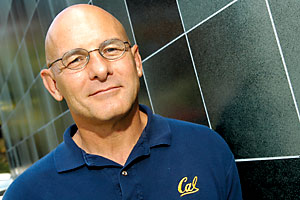
David Andrew Patterson is an American computer pioneer and academic who has held the position of professor of computer science at the University of California, Berkeley since 1976. He announced retirement in 2016 after serving nearly forty years, becoming a distinguished software engineer at Google. He currently is vice chair of the board of directors of the RISC-V Foundation, and the Pardee Professor of Computer Science, Emeritus at UC Berkeley.

David Dana "Dave" Clark is an American computer scientist and Internet pioneer who has been involved with Internet developments since the mid-1970s. He currently works as a Senior Research Scientist at MIT's Computer Science and Artificial Intelligence Laboratory (CSAIL).

László "Laci" Babai is a Hungarian professor of computer science and mathematics at the University of Chicago. His research focuses on computational complexity theory, algorithms, combinatorics, and finite groups, with an emphasis on the interactions between these fields.
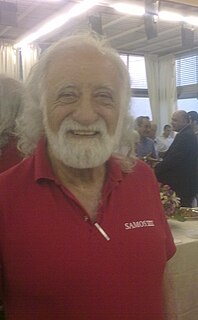
Yale Nance Patt is an American professor of electrical and computer engineering at The University of Texas at Austin. He holds the Ernest Cockrell, Jr. Centennial Chair in Engineering. In 1965, Patt introduced the WOS module, the first complex logic gate implemented on a single piece of silicon. He is a fellow of both the Institute of Electrical and Electronics Engineers and the Association for Computing Machinery, and in 2014 he was elected to the National Academy of Engineering.
Wen-mei Hwu is the Walter J. Sanders III-AMD Endowed Chair professor in Electrical and Computer Engineering in the Coordinated Science Laboratory at the University of Illinois at Urbana-Champaign. His research is on compiler design, computer architecture, computer microarchitecture, and parallel processing. He is a principal investigator for the petascale Blue Waters supercomputer, is co-director of the Universal Parallel Computing Research Center (UPCRC), and is principal investigator for the first NVIDIA CUDA Center of Excellence at UIUC. At the Illinois Coordinated Science Lab, Hwu leads the IMPACT Research Group and is director of the OpenIMPACT project – which has delivered new compiler and computer architecture technologies to the computer industry since 1987. From 1997 to 1999, Hwu served as the chairman of the Computer Engineering Program at Illinois. Since 2009, Hwu has served as chief technology officer at MulticoreWare Inc., leading the development of compiler tools for heterogeneous platforms. The OpenCL compilers developed by his team at MulticoreWare are based on the LLVM framework and have been deployed by leading semiconductor companies. In 2020, Hwu retired after serving 33 years in University of Illinois at Urbana-Champaign. Currently, Hwu is a Senior Distinguished Research Scientist at NVIDIA Research and Emeritus Professor at University of Illinois at Urbana-Champaign.
Krishna V. Pale is a computer scientist and engineer of Indian origin and is the Kenneth and Audrey Kennedy Professor of Computing at Rice University and the director of Institute for Sustainable Nanoelectronics (ISNE) at Nanyang Technological University (NTU). He is recognized for his "pioneering contributions to the algorithmic, compilation, and architectural foundations of embedded computing", as stated in the citation of his 2009 Wallace McDowell Award, the "highest technical award made solely by the IEEE Computer Society".
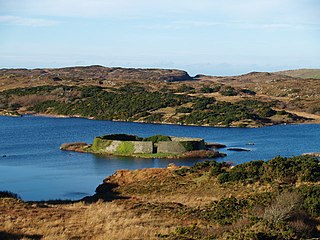
Boyle / O'Boyle is a surname of Irish origin. It is anglised from the Gaelic Ó Baoighill/Ó Baoill.
Ralph Anthony Brooker, was a was a British computer scientist known for developing the Mark 1 Autocode.

Michael Ralph Stonebraker is a computer scientist specializing in database systems. Through a series of academic prototypes and commercial startups, Stonebraker's research and products are central to many relational databases. He is also the founder of many database companies, including Ingres Corporation, Illustra, Paradigm4, StreamBase Systems, Tamr, Vertica and VoltDB, and served as chief technical officer of Informix. For his contributions to database research, Stonebraker received the 2014 Turing Award, often described as "the Nobel Prize for computing."
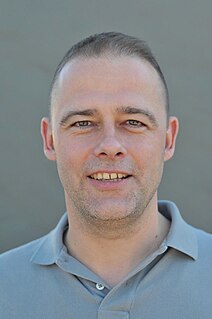
Michael Franz is an American computer scientist best known for his pioneering work on just-in-time compilation and optimisation and on artificial software diversity. He is a Chancellor's Professor of Computer Science in the Donald Bren School of Information and Computer Sciences at the University of California, Irvine (UCI), a Professor of Electrical Engineering and Computer Science in the Henry Samueli School of Engineering at UCI, and Director of UCI's Secure Systems and Software Laboratory.
Peter J. Braam is a Dutch-American computer scientist, mathematician and entrepreneur focused on large-scale computing. As an academic, Braam held senior faculty positions at the University of Utah, Oxford, Carnegie Mellon, and visiting or adjunct positions at the University of British Columbia, the Chinese Academy of Sciences and the University of Cambridge.